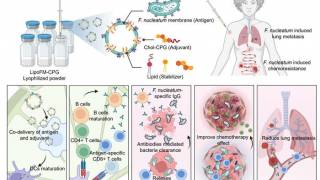Gardasil 9 Vaccination Could Eliminate Most Cervical Cancers

A vaccine that can literally eradicate the majority of cervical cancer cases shows long-term effectiveness in a study published in The Lancet.
In this Lancet study, women were followed for efficacy at preventing disease for up to six years after the first vaccine shots, and they were followed for production of infection-halting antibodies against the nine genotypes of HPV for more than five years
This study in 18 countries solidifies the initial phase 3 efficacy and safety trial of the nine-valent human papillomavirus vaccine, Gardasil 9, that was published in February 2015 in The New England Journal of Medicine.
These new results showed Gardasil 9 was 97.4 percent efficacy to prevent infections and disease caused by the five additional HPV genotypes not included in the four-valent Gardasil vaccine.
Additionally, the Gardasil 9 vaccination produced similar antibody protection against the four HPV genotypes addressed by the Gardasil vaccine.
"There is no question that the Gardasil 9 vaccine works," said primary author Warner Huh, M.D., professor and director of the University of Alabama at Birmingham Division of Gynecologic Oncology and a senior scientist at the UAB Comprehensive Cancer Center.
"We're on the verge of a dramatic change that will positively affect all individuals, particularly women, in the United States. The challenge is to get the new vaccine into widespread use among young women," said Dr. Huh.
The UAB Comprehensive Cancer Center and a coalition of Alabama health groups last year launched a formal call for action, urging Alabama parents and health care providers to get both girls and boys vaccinated against the sexually transmitted human papillomavirus, or HPV.
The Gardasil 9 vaccine immunizes against nine genotypes of HPV known to cause cervical cancer, as well as vulvar, vaginal and anal cancers and genital warts caused by HPV.
This vaccine is an advance over the four-valent HPV vaccine, Gardasil, which was approved by the FDA in 2006.
Gardasil 9 targets those four genotypes and five additional ones as well. Both vaccines are prophylactic, meant to be given before females or males become exposed to possible HPV infection through intimate contact.
"In the state of Alabama, almost half of girls and boys do not receive the HPV vaccine," Dr. Huh said.
"With this new vaccine, there is a very legitimate opportunity to wipe out cancers that are caused by HPV, particularly cervical cancer in women.
"Seventy-five years ago, cervical cancer was a very common cause of mortality in the United States. Looking forward, with widespread vaccination, it is highly likely that cervical cancer will evolve into historical interest only, and screening, like Pap smears, might go away altogether.”
“HPV vaccines are one of the most scrutinized vaccines ever, but multiple studies have demonstrated the vaccine to be safe and well-tolerated.
HPV infections are the most common sexually transmitted disease in the U.S., and several subtypes of the virus are responsible for cancers of the cervix, vagina, penis, tongue, throat and anus, according to the Centers for Disease Control and Prevention (CDC).
The CDC reported 31,500 people are diagnosed with cancer related to HPV each year.
During 2016, the CDC’s Advisory Committee on Immunization Practices approved a two-dose schedule for adolescents under age 15 instead of the traditional three-dose schedule. Teens starting at age 15 or later still need three doses.
The CDC Vaccine Price List provides the private sector vaccine prices for general information.
Most pharmacies offer vaccination services, including HPV.
Vaccine discounts can be found here.
The randomized double-blind efficacy, immunogenicity and safety study involved 105 sites in Austria, Denmark, Germany, Norway and Sweden; Brazil, Chile, Colombia and Peru; Canada, Mexico and the United States; and Hong Kong, Japan, New Zealand, South Korea, Taiwan and Thailand.
The study was sponsored and funded by Merck & Co, the manufacturer of Gardasil9.
These researchers may have various conflicts of interest: Dr. Huh helped develop and test Gardasil. Dr. Huh and 27 co-authors represent 21 universities in Europe, Canada, South America, Australia and the United States, as well as Merck & Co. At UAB, Dr. Huh holds the Margaret Cameron Spain Chair in Obstetrics and Gynecology.
Our Trust Standards: Medical Advisory Committee
- Vaccine to prevent most cervical cancers shows long-term effectiveness
- Final efficacy, immunogenicity, and safety analyses of a nine-valent human papillomavirus vaccine in women aged 16–26 years: a r
- Human Papillomavirus Vaccination Rates in Young Cancer Survivors
- National, Regional, State, and Selected Local Area Vaccination Coverage Among Adolescents Aged 13–17 Years — United States, 2016
- Parents' willingness to get human papillomavirus vaccination for their adolescent children at a pharmacy.

























